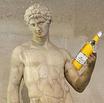A - Sure, Prefontaine drank, as do many elite athletes, and it may well have been a factor in his car crash death, although whether the autopsy blood test was conducted appropriately seems a matter of some debate. But that’s another discussion. (BTW, I was and remain a huge fan of Pre – here’s an unfortunately low quality youtube video of his winning the NCAA 3 mile Championships, with about 12 stitches in his foot, due to a diving accident a few days before... But here's one of the best Pre videos for capturing the essence of this charismatic runner).
Many athletes maintain that having a couple of drinks helps them relax - it simply serves as a strategy for anxiety control, and this may be particularly the case around an important competition, and even afterwards.
Others will defend their quaffing by arguing that a good bender, once in a while, almost seems to provide a psychological escape and release from their otherwise Spartan lifestyle, but then they immediately stumble back on the wagon.
And then there are those, who will actually plan for bender as a motivator, setting a date to really let loose, once the big race is out of the way.
From my point of view, I have a couple of prime concerns, apart from the obvious ones of:
- drinking under age
- alcoholism
- the far greater risk of accidents while under the influence
- the immediate impact on performance after a binge
The first is the recognition that alcohol is high in calories: one gram = 7 calories, while one gram of carbohydrate or protein is closer to 4 calories; thus weight management is an issue.
The second is how the alcohol consumption affects the amount and quality of sleep, remembering that much of the adaptations to training actually take place when we're sleeping, which is about 25 to 30 years of our lives.


 RSS Feed
RSS Feed
